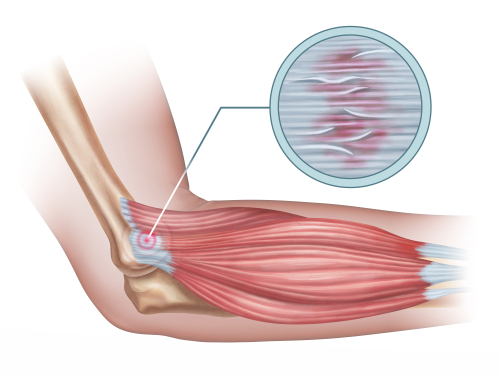Comparison of Interventions for Tennis Elbow aka Lateral Elbow Tendinopathy
Filed under Treatments, Uncategorized
Reference:
Lowdon, H., Chong, H. H., Dhingra, M., Gomaa, A.-R., Teece, L., Booth, S., Watts, A. C., & Singh, H. P. (2024). Comparison of interventions for lateral elbow tendinopathy: A systematic review and network meta-analysis for patient-rated tennis elbow evaluation pain outcome. The Journal of Hand Surgery, 49(7), 639–648. https://doi.org/10.1016/j.jhsa.2024.03.007
Brief Overview:
This Level 1 evidence article is a systematic review of treatments for tennis elbow also known as lateral epicondyle tendinopathy across various randomized controlled trials. The research aimed to identify which interventions provided the most benefits compared to any placebos for short-term (up to 6 weeks) and midterm (6 weeks up to 6 months) outcomes. In treating tennis elbow, a variety of interventions are typically used, including activity modification, physiotherapy, orthotics, medical treatments (including injection therapies), and surgery. The researchers of this study aimed to expand the evidence on this subject by comparing interventions to placebos and control groups.

Methods:
The evidence was collected following the Cochrane Handbook standard systematic review protocol. The study included a total of 13 randomized controlled trials (RCTs) and quasi-RCTs. Eligible criteria included adult patients aged at least 18 years, interventions (therapy, injection therapy, extracorporeal shockwave therapy [ECSWT], acupuncture/dry needling, and surgical release), control/placebo or other included intervention comparisons, PRTEE pain score, and sufficient data. The outcome measures were the Patient-Rated Tennis Elbow Evaluation (PRTEE) pain score, a validated 15-item questionnaire consisting of pain and function specific to lateral epicondyle tendinopathy.
Results and Conclusions:
Therapy and exercise showed improvement in the PRTEE pain score during midterm follow-up. The study showed that dry needling may yield potential short-term benefits, but individual response varied. Two injection therapies, autologous blood and steroid injections, improved PRTEE pain score at midterm follow-up. Orthotics, ECSWT, TENS, and surgery showed no statistically significant benefit according to the PRTEE pain score. Researchers concluded that the results should be interpreted with caution because of the limited amount of evidence that met the criteria. The optimal treatment for lateral epicondyle tendinopathy is still not concrete; however, physiotherapy or exercise is the intervention best supported by evidence.
Rating:
4/5 – This article is a Level 1 therapeutic evidence article, a high ranking of evidence. The authors considered the most common interventions and effectively discussed how the trials used supported their conclusions.
2 Comments
Leave a Comment
More To Read
Do you know the secret ingredient to recovering from an injury?
Do you know the secret ingredient to recovering from an injury? I will give you a hint it is 5 letters and begins with the letter S. SLEEP Have you ever asked yourself a question – does sleep help injuries heal? This is for you to share with your patients but also serve as a…
Wound Healing in Hand Therapy
By: Maddie Mott Wound healing (healing hand therapy) involves a complex series of interactions between different cell types, cytokine mediators, and the extracellular matrix with its four basic stages including hemostasis, inflammation, proliferation, and remodeling (Mackay & Miller, 2003). Because successful wound healing requires adequate blood and nutrients to be supplied to the site of…
Assessments Seen in the Hand Therapy World
By: Dalton Busch Below I have created a list of some of the common assessments that are seen in the hand therapy world. Keep in mind that this list is not inclusive of all the assessments you might come across in this setting. With each assessment, I describe what it is, who the assessment is…
Vagus Nerve Stimulation (VNS) for Various Etiologies
What is it: Vagus nerve stimulation (VNS) is a medical treatment that uses a device to deliver electrical impulses to the vagus nerve, which runs on both sides of the body from the lower brain through the neck to the chest and stomach. The left vagus nerve is typically used for this procedure, as simulating…
Sign-up to Get Updates Straight to Your Inbox!
Sign up with us and we will send you regular blog posts on everything hand therapy, notices every time we upload new videos and tutorials, along with handout, protocols, and other useful information.







Any details on the therapy and exercise used?
The meta analysis did state specific exercises as it reviewed several articles all with different exercises.